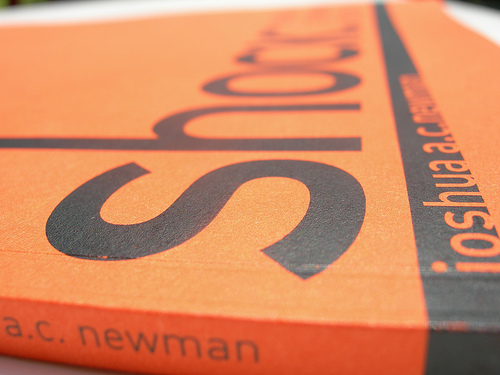I am reading Shock: Social Science Fiction v 1.1.1 by Joshua A C Newman. Not a novel but a ‘fiction game’ (Or Role-Playing Game if you are old style) handbook leant to me by the eminently cool Will Ellwood.
Shock is pretty effing fascinating. The first page explains that the handbook uses the ‘DIN fonts originally designed for street signs in Germany just before the Nazi Party took over.’ and goes on to explain this is because the font represents the ‘ideal of the Modern with a twinge of the horror it can contain.’ Yes, that’s right Toto, you aren’t in Advanced Dungeons & Dragons any more. This is a (very) intelligent RPG, that asks the player to do things that make the kind of pseudo-intellectuals who staff university critical theory departments look like scalp scratching primates.
Shock is a framework that has its players improvise science fiction scenarios based on the interactions and conflicts of certain Issues (slavery, imperialism etc etc) and Shocks (replicants, mind transfer) and Minutia. Or in other words, the gamut of tropes drawn from more than a century of science fiction. I’m not going to expend time I should be sleeping to explain the rules any further when you can explore them on the games website, but let me assure you they are very, very interesting.
(Shock uses the excellent neuter term *Tagonist to denote the meta of Protagonist / Antagonist. I love it.)
As i read the handbook Shock is making me think some things. It is making me think that science fiction is powered by a small number of essential processes, and Shock does a good job of pinpointing what they are. It also makes me think that if we can accurately describe the meta framework of science fiction this way, then the task for science fiction writers is not to keep filling that framework with more stuff, but to start reengineering the framework itself. Don’t keep churning the same old products out of the factory. Don’t even build a new factory. Conceptualise a whole new manufacturing process and see what it produces.
It also makes me think that I want to play this game! Let me know if you want to play also, and we will find a way.

Sounds great :D
LikeLike
I am shocked that you should think that Science Fiction has a rulebook. Shocked, I tell you!
LikeLike
Well there is!
LikeLike
Sufferin’ singularities! A rulebook for Science Fiction indeed!
LikeLike
This sounds awesome, count me in! … for the next time we see each other. Southern France?
LikeLike
Could you explain the penultimate paragraph in more details please?
LikeLike
Consider it done.
LikeLike
I have run Shock numerous times and find it an indispensable set of mechanics when the goal is to tell intricate science-fiction stories. Most sci-fi RPGs tend to tacitly hand the players a kind of rules “armor” against a truly interesting narrative: your character is an isolated monad with a set of abilities and equipment to be employed in reaction to a gamemaster’s set of situations.
In Shock, you place the character within a tension-laced social field which is then made all the more tense via the science-fiction element: your character is an embedded entity with a mission to experience the literary consequences of the scenario collectively generated.
It is (on average) deeply moving and often chilling. Thoughts are inevitably provoked.
LikeLike
Hi guyintheblackhat! I’m not an RPG player, so I can’t comment on how the mechanics work in play, but they are certainly and interesting analysis of the SF genre. I am interested however that the RPG field might be producing more interesting ideas than the Fiction field. Are we entering a new era of collaborative storytelling perhaps?
LikeLike
Hi Damien,
I certainly hope so – our stories would improve on all sides! We tend to get caught up with the importance of our own medium (television, fiction books, film, video-games, role-playing games, etc.) and sometimes don’t realize that other people are having more productive conversations about similar topics right next door. To be more specific, we in RPG theory just recently (within the last decade) discovered how much we can learn from novelists, creating functional suspense mechanisms within the rules themselves. Now we’d like to return the favor. ;-)
I’d start by reading Emily Care Boss’ overview of Forge theory in Playground Worlds and then look at some of the RPGs available at the The Unstore.
LikeLike
That’s more or less our hope, yes.
LikeLike
Hi Robert. When you say ‘our’ who do you mean? I’m excited by the idea, so I’d like to see where these ideas are being developed and talked about.
LikeLike
Sure thing!
As you can imagine, in any subculture there’re endless definitional wars, but I’m talking about the stuff they’re talking about on this Wikipedia page.
In brief, around 2000, a bunch of guys created a site called The Forge for a focused discussion about a new kind of roleplaying game design that would allow you to do shit besides killing orcs. Rules that encouraged you to make Dickiean mindfuck sci-fi. And stories about slaves in the US Antebellum South, or teenage rebellion in a fucked-up future, or quasi-Mormon paladenic cowboys in a West that never was.
A lot of discussion about these games is had on the Story Games forum.
LikeLike